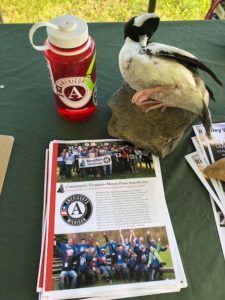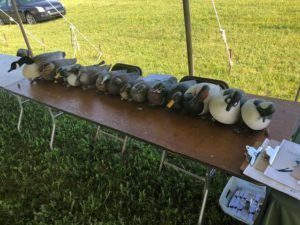MUCC & HPA at Crandell Park Water-Festival
Before I became a Huron Pines AmeriCorps (HPA) member, I worked for the Barry Conservation District in Hastings, MI. While I was there, I got to know the Watershed Coordinator for both Barry and Eaton Counties, David Comeau. He is passionate about educating the public on our watersheds. He created a community event that was focused on educating the public and connecting them to their water resources. The planning of the event began right as I left the district and at that time the Executive Director, David and the rest of the board were working hard to piece details together.

I knew that David was looking for vendors, so I quickly sat down with Shaun (MUCC Education Director) and discussed how MUCC could contribute to this community event. Being that this was a water-festival, we decided that I could talk about ducks, their habitat and key characteristics on how to identify different species that are found here in Michigan. David approved of the vendor pitch and was happy to have MUCC join the event.
Leading up to the festival, I had Shaun take me through, what I like to call duck training 101. He made sure I knew the names and characteristics of each duck I was to talk about. I really appreciated the knowledge, because I did not know much about ducks before joining MUCC. Now, I had the opportunity to share what I had learned with others.
 The weather was everything I could have asked for and more. The sun was out and shinning as people started to walk through the gates of Crandell Park in Charlotte, MI on Saturday morning. The park had accommodated for vendor tables, a live band, food trucks, lawn games, free kayak/canoe rentals and fishing stations at the lake. Myself and seven other vendors were set up under or near a tent. My booth was set up with two tables. One table had taxidermy ducks and coots, MUCC and HPA flyers, TRACKS magazines and Michigan Out-Of-Doors Youth Camp booklets. The other table displayed 14 different waterfowl decoys and clipboards with duck identification guides. My goal was to educate the attendees on how many different types of ducks there are in Michigan. I had a wide range of audience members, from kids to seniors. Not one person could name them all but that was the point of an education/outreach event such as this, so that next time they see an unfamiliar duck they could have a better chance identifying it by its characteristics. I was also able to share who I was representing, MUCC & HPA, and received some positive comments in doing so. One gentleman thanked me (MUCC) for being there, another wanted to sign up for a membership and several parents wanted to subscribe to TRACKS magazine.
The weather was everything I could have asked for and more. The sun was out and shinning as people started to walk through the gates of Crandell Park in Charlotte, MI on Saturday morning. The park had accommodated for vendor tables, a live band, food trucks, lawn games, free kayak/canoe rentals and fishing stations at the lake. Myself and seven other vendors were set up under or near a tent. My booth was set up with two tables. One table had taxidermy ducks and coots, MUCC and HPA flyers, TRACKS magazines and Michigan Out-Of-Doors Youth Camp booklets. The other table displayed 14 different waterfowl decoys and clipboards with duck identification guides. My goal was to educate the attendees on how many different types of ducks there are in Michigan. I had a wide range of audience members, from kids to seniors. Not one person could name them all but that was the point of an education/outreach event such as this, so that next time they see an unfamiliar duck they could have a better chance identifying it by its characteristics. I was also able to share who I was representing, MUCC & HPA, and received some positive comments in doing so. One gentleman thanked me (MUCC) for being there, another wanted to sign up for a membership and several parents wanted to subscribe to TRACKS magazine.
It was a good turnout for the first (hopefully, annual) Crandell Park Water-fest. Every impact matters at outreach events, and I am happy to have helped out an old co-worker and represent MUCC & HPA at the same time.
The post MUCC & HPA at Crandell Park Water-Festival appeared first on Michigan United Conservation Clubs.
Recent Posts



